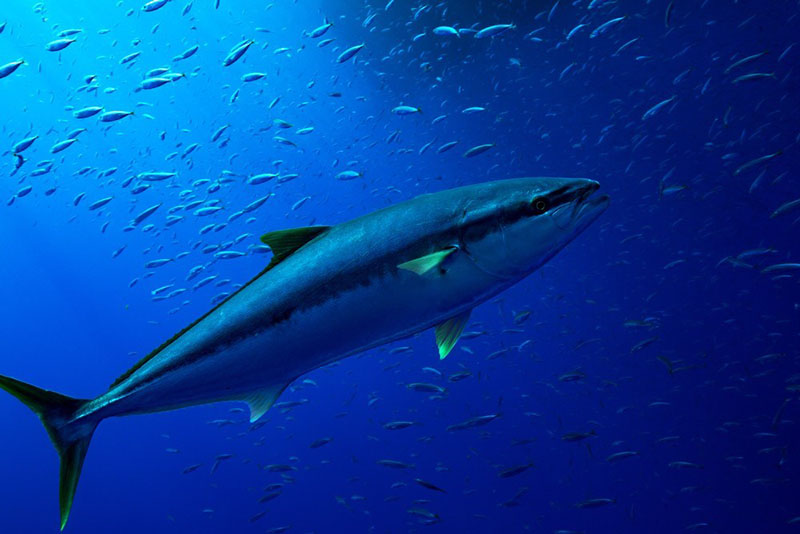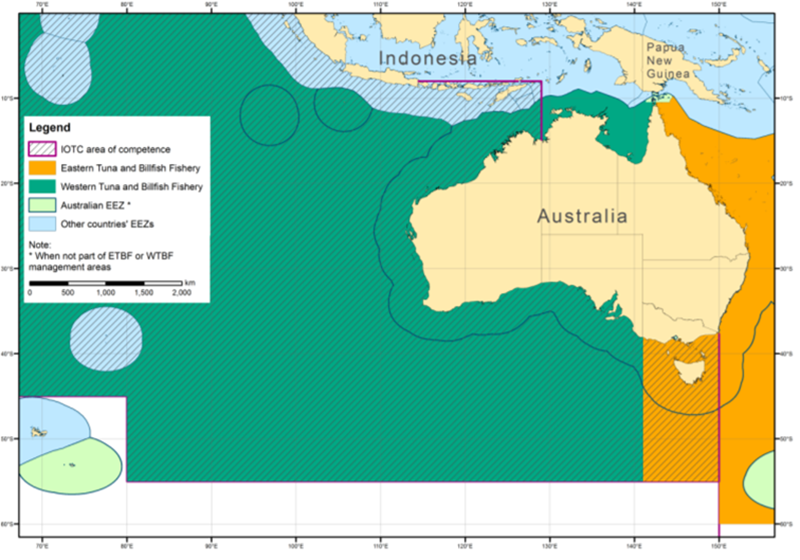The Indian Ocean Tuna Commission (IOTC) is an intergovernmental organisation mandated to sustainably manage highly migratory (tuna and tuna-like) fisheries resources in the Indian Ocean. The objective of the IOTC is to promote cooperation amongst contracting members to ensure through appropriate management, the sustainable use of fishery resources.
The Indian Ocean is the second largest tuna fishery in the world. The resources significantly contribute to food security and economic growth throughout the region.
Species
Conservation and management measures are in place to maintain and protect the sustainability of both target and non-target species, including;
- Yellowfin tuna (Thunnus albacares)
- Skipjack (Katsuwonus pelamis)
- Southern Bluefin tuna (Thunnus maccoyii)
- Bigeye tuna (Thunnus obesus)
- Albacore (Thunnus alalunga)
- Striped marlin (Kajikia audax)
Temperate and tropical tunas targeted by large scale industrial vessels and artisanal vessels throughout the Indian Ocean. These species are of high importance to many of the developing coastal States in the area. Cooperation amongst the coastal States and other countries fishing in the Area is essential to ensure the sustainability of both stocks and economies throughout the region.
For a full list of species managed by IOTC visit IOTC area of competance.
IOTC Area of competence
The above figure shows the Eastern Indian Ocean Area of Competence which covers 45° south to 0°along the equator, and 80° to 150° east. There is an overlap with the Western and Central Pacific Fisheries Commission (WCPFC) along Australia’s Victorian Coastline, and the Commission for the Conservation of Southern Bluefin Tuna (CCSBT) overlapping along the Southern-Western Coastline finishing at the Northern end of Australia. The IOTC Area of Competence extends further throughout the Western Indian Ocean.
Australia’s role and highlights in IOTC
Australia is a responsible regional partner in the IOTC. Australia ensures it:
- meets international obligations to conserve and manage highly migratory fish stocks
- contributes to regional security, including food security
- ensures continued access and future development opportunities for the Australian fishing industry
- prevents any significant adverse impacts on the marine environment from fishing.
Australian fisheries target tuna and billfish in the IOTC Area of Competence, these fisheries are:
- the purse seine fisheries – Eastern and Western Skipjack Fisheries and the Southern Bluefin Tuna Fishery.
Australia is a major coastal state within the IOTC Area of Competence. We work with other member countries to improve the performance and effectiveness within the IOTC.
Australia contributes scientific research to ensure the environmental and economic sustainability of these fisheries. Other coastal States are encouraged to develop and implement similar ideas, which ensures the IOTC recognises the rights of coastal states when adopting new measures. Read more these fisheries through the ABARES Fishery Status Report.
Australia encourages all fishing States and entities that operate in the Indian Ocean to take part in the IOTC. This ensures cooperation between the IOTC and other regional fisheries bodies, including the Commission for the Conservation of Southern Bluefin Tuna and the Southern Indian Ocean Fisheries Agreement.
IOTC history and membership
The Agreement for the Establishment of the Indian Ocean Tuna Commission was adopted by the Food and Agriculture Organisation of the United Nations at the 105th Session in Rome on 25 November 1993. The Agreement entered into force on 27 March 1996, with Australia joining the IOTC November 1996.
Find out more abou the history of the IOTC.
- The IOTC currently has 31 contracting parties who are members of the IOTC and two Cooperating non-
- Contracting Parties, Liberia and Senegal.
- Full list of IOTC member countries (IOTC website).
Membership of the IOTC is open to:
- Indian Ocean coastal countries
- countries, or regional economic integration organisations, that are members of the UN
- countries that are members of UN special organisations
- countries that fish for tuna in the Indian Ocean
Annual Meetings
Annual Sessions of the Commission are normally held in the second quarter of the year. Find out more about IOTC meetings.


